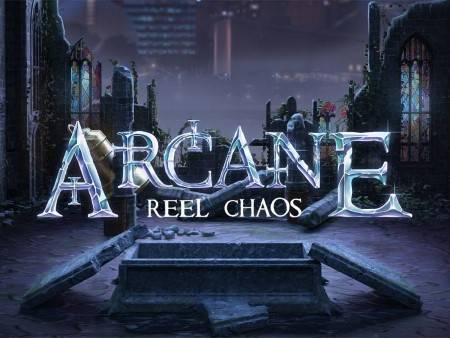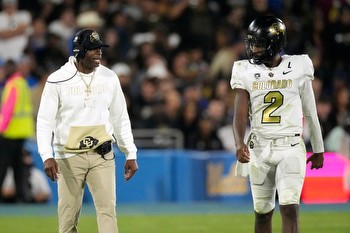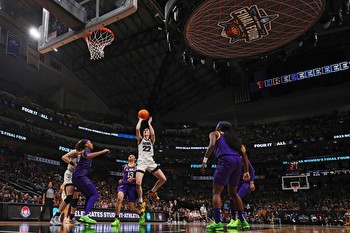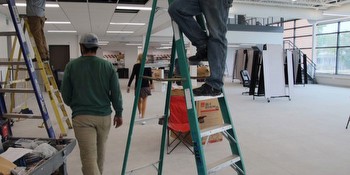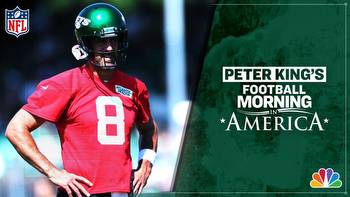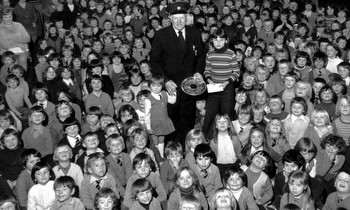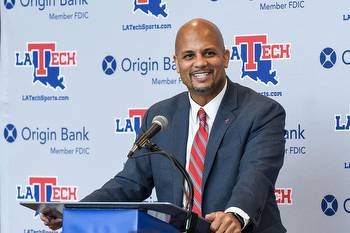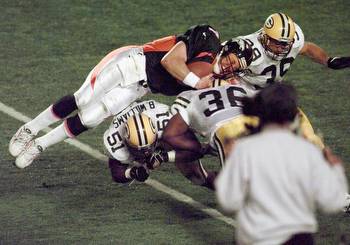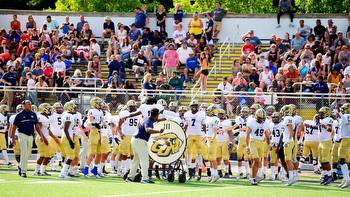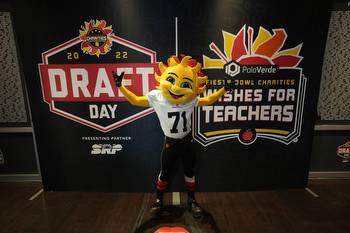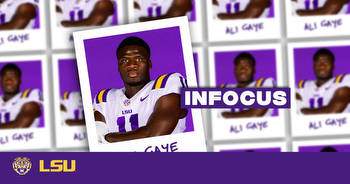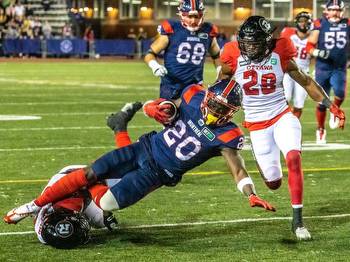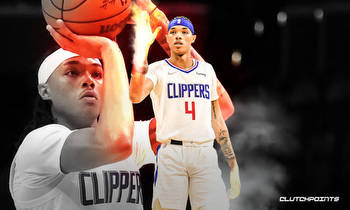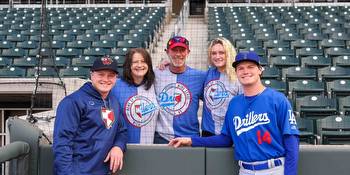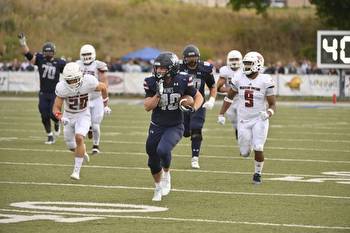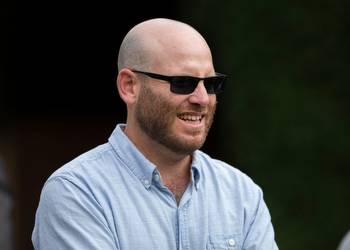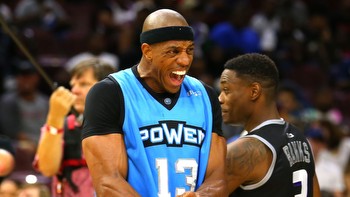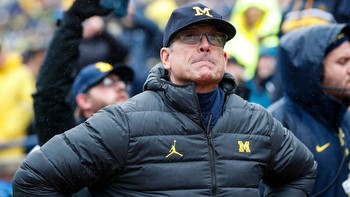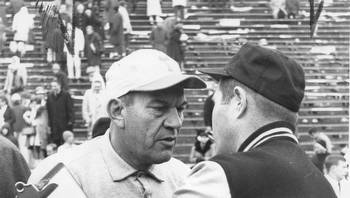Copeland out to beat odds with Rincon/University football
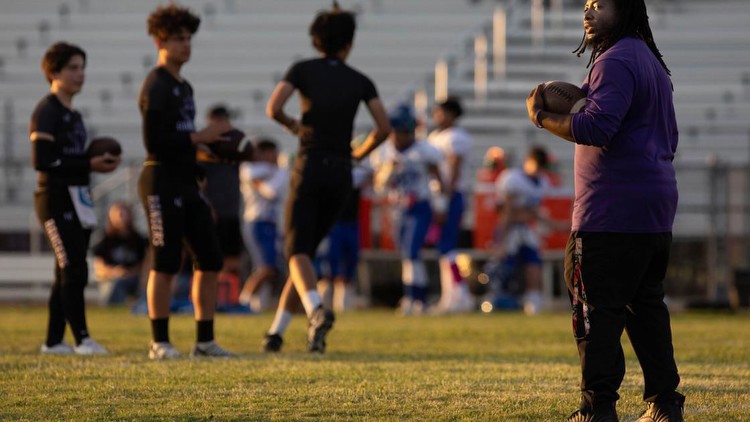
Donning purple helmets and black uniforms, the players march from the locker room to the field, two by two, arms linked. One of them carries a sledgehammer.
They gather behind the east end zone. Time to get fired up.
“Who are you?” an assistant coach repeatedly asks.
“Rangers!” they respond in unison.
A banner flapping in the warm summer breeze beckons them, and they burst through it. The crowd jammed into the home-side bleachers roars.
Then the game starts. And everything that can go wrong does for the Rincon/University High School football team.
Visiting Safford returns the opening kickoff for a touchdown. On the Rangers’ first play from scrimmage, the shotgun snap comes in low. A hurried pass is intercepted.
Safford scores on its second play from scrimmage to make it 14-0. “Rangers, pick your head up,” head coach Khyree Copeland implores. “Keep playing.”
A long pass sets up a field goal to make it 14-3. Then Safford returns another kickoff for a touchdown. It’s 21-3. It’s still the first quarter.
By the end of the period, it’s 28-3. By halftime, it’s 49-10. The final is 49-17.
Copeland knew there would be days like this. The Rangers have had one winning season over the past decade. Their record in the 10 seasons prior to this one was 18-74.
Before the loss to Safford, Rincon/University was 2-0 — matching its win total from the previous three seasons combined. The Rangers were playing with house money in a sense — and their performance on this Friday night reflected that.
“Even though we're turning the page and we're turning into a great program, we still got a lot of work to do,” Copeland says after the game. “We still have a bunch of work to do when it comes to ... being committed.
“We're gonna continue preaching togetherness, brotherhood, family. But we can't just preach it. We gotta also walk it.”
Copeland has been at Rincon/University for six years. This is his fourth year as the Rangers’ head coach. He is a fascinating figure, an inspirational leader, an agent of change, a modern-day Joe Clark of “Lean on Me” fame.
Copeland is striving to turn around one of Tucson’s many scuffling city programs. As a football coach and special-education teacher, he is aiming to take kids who are, in his words, “a little rough around the edges” and help them become respectful, productive young adults.
All Copeland is asking from those kids is to follow his lead and take a leap of faith.
Finding a way
I walk onto the field just as practice is concluding and introduce myself to Copeland. He proceeds to introduce me to every single coach on his staff. We all shake hands. Copeland is big on manners. It’s the way his parents raised him. Handshakes, proper introductions, eye contact — they’re non-negotiable.
Copeland guides me to his classroom. We spend nearly two hours there as Copeland tells me his story, outlines his goals, describes his vision, delivers his message.
We discuss the challenges and rewards of being a special-ed teacher; he scoffs at the mere suggestion of the former.
“I don’t see any challenges,” Copeland says. “I really don’t. I see it as: Somebody has to change the world. Why not me?”
He will acknowledge that being the football coach at Rincon/University isn’t the easiest gig. It’s one of many city schools that have struggled in recent years, not just to win games but to even field a team. The landscape of Southern Arizona high school football has changed over the past decade.
“I definitely took notice of it,” says Copeland, 33, who’s originally from Jacksonville, Florida. “But ... we don't complain about it. We’re gonna find a way to get it done.”
Copeland spent two seasons as an assistant under Mike Strack before succeeding him in the spring of 2020 — the heart of the pandemic. Two months later, Rincon’s athletic director left. Copeland seemed to be starting in a hole.
“If you see it that way,” he says. “I just saw it as a chance to build something special at a school that nobody thinks much of.”
His first season as head coach was barely a season at all; the Rangers played two games, losing both by a combined score of 91-10.
They were 1-7 the following season when Copeland decided to forfeit the final two games. Some players had suffered concussions. The team’s equipment — especially the helmets — wasn’t up to par. He was concerned for the players’ safety and told their parents as much.
Then Copeland went to work. He “begged and pleaded” for the money needed to get new helmets. He made deals with equipment and uniform suppliers. He found a way to get it done.
“He’s really hustled,” Rincon principal Alissa Welch says. “Fundraising, hitting up site councils, PTA ... he went above and beyond.”
The Rangers went 1-9 again in 2022. But the program was registering wins in Copeland’s view. Two players, quarterback Gabe Lopez and tight end Matthew Carr, had gone on to play college ball. And the team finished the season.
“A step in the right direction,” Copeland says.
Although he badly wants to win — not just games but state championships — Copeland doesn’t necessarily measure success that way. When we talked, 98% of the football team was academically eligible. Last year, that figure was 95%.
Copeland has implemented mandatory study hall before practice. Players must put their phones in an old cash box that looks like a beat-up suitcase. They weren’t happy about it at first.
“But we still do it,” junior quarterback Thomas Montgomery says. “Because we know that it means something — we know that it's gonna help us.”
Copeland also conducted a week-long camp in the summer that included on-field work, meals, video games and hanging out. Such camps are commonplace at more established programs. Not so much at Rincon/University.
“At the beginning, we were like, ‘Man, we don't want to be here. Like, I don't know these people,’ ” Montgomery says. “But then at the end we were like, ‘I want to come here again. I'm sad that this camp is over.’
“We were brothers. We were a team.”
Dreaming big
Welch needed a special-ed teacher to run a self-contained classroom. They aren’t easy to find. And then ...
“He just fell out of the heavens,” Welch says.
Copeland — who had been living in the Chicago area, where he starred as a running back at Concordia University — was looking for a job in Tucson. He had made a promise to a dear, departed friend — to move west and become a full-time teacher — and he was going to fulfill it.
Welch saw his résumé and interviewed him over the phone. Copeland was exactly the candidate she was seeking. She took a leap of faith and hired him.
“You could just tell he was really sharp, very passionate, really wanted to make a difference,” Welch says.
Copeland proved to be a natural leader of young people. One of his mentors, Nick Hildreth, a special-ed teacher and the head football coach at Willowbrook High School in Villa Park, Illinois, lauded Copeland’s “ability to connect to kids, build relationships with kids.”
Copeland was destined to become a teacher and a coach. It just took him a while to realize it.
Growing up in Jacksonville in the 1990s and early 2000s, Copeland wanted to attend and play at Miami. He has several pennants adorning the walls of his classroom, including two from “The U.”
But Copeland wasn’t big enough. When a Miami assistant coach came to The Potter’s House Christian Academy to see one of Copeland’s teammates, “I was like 5-foot-maybe-6," he says. Copeland isn’t one to take no for an answer, so he spent an entire summer “trying to stretch — get them legs going someway, somehow.”
It didn’t work. But a former teammate told him about Concordia, a Lutheran university outside of Chicago that plays Division III football.
Copeland never had been on a plane before. He never had been that far north. He never had experienced a Midwest winter.
“Oh my God, it was a culture shock,” Copeland says. “I was like, ‘I don't know if I really belong here.’ ”
Then Copeland met Katie Kloess.
A friend and a calling
Kloess was a multisport athlete at Concordia and Copeland’s tour guide when he visited.
“She was like, ‘Me and you are gonna be best friends,’ ” Copeland says. “I was like, ‘I don’t know. We may not even see each other after this.’ ”
Copeland took a leap of faith and decided to attend Concordia. As she predicted, Kloess and Copeland became great friends. She saw something in him that he couldn’t see in himself — and played an instrumental role in him being where he is today. We’ll get to that soon. Promise.
Copeland’s ability as a football player was obvious. He completed his four-year career at Concordia as the school’s all-time leader in rushing yards (3,957) and touchdowns (43). As a senior in 2010, he rushed for 333 yards in one game. “In three quarters,” Copeland corrects.
He wanted to play in the NFL, a dream that he probably clung to for too long. He played in the Continental Indoor Football League for a bit. Every potential NFL opportunity fell through. Reality eventually set in.
“At this point, I gotta go find a career,” Copeland says. “Me chasing the NFL ... I need to be chasing a calling.”
He started coaching, first at his alma mater, then at the high school level. He became an aide for Hildreth’s wife, Abbie, also a special-ed teacher.
But what seems crystal clear today — that Copeland’s purpose in life was to coach and teach — was still murky for him back then. Did you know exactly what you wanted to do in your 20s?
Kloess knew. She told Copeland he should become a teacher. She herself would become one.
Kloess had talked Copeland out of leaving Concordia. She had been right about that. So Copeland pursued that path.
Later, she advised him to set out on his own. She suggested he move to Arizona.
“That's pretty random,” Copeland recalls telling her, “but OK, I hear you. I said, ‘Phoenix or Tucson?’ ‘Tucson.’ OK. And I was like, ‘If I'm leaving, you gotta come with me.’ She said, ‘I'm down.’ ”
Before they could pursue their manifest destiny together, Kloess died in a car accident. She was on her way to coach a basketball game. She was 29 years old.
“When she passed away, it was a punch to the gut,” says Kathy Gebhardt, Kloess’ former volleyball coach at Concordia who’s now the school’s dean of students and vice-president for student success & athletics. “There’s no doubt she left an eternal impact on Khyree. My guess is that he’s taking every opportunity each day to make her proud and live that legacy.”
Copeland had a couple of relatives out here. He took another leap of faith. He also remembered something his “guardian angel” had told him — something he swears is true: You’re going to coach a team that wears purple and black.
Togetherness and belief
The game against Safford is spiraling, and frustrations are mounting.
After getting beaten for a touchdown, defensive back Azvia Park gets a penalty for unsportsmanlike conduct. Copeland sprints over to him for a heart-to-heart.
“You cannot give up that play and then exacerbate it by going after a kid,” Copeland recalls telling Park. “You gotta keep your composure.
“We're gonna keep rocking with you. We believe in you. Do you believe in us?”
In the second half, defensive lineman Habib Moutran gets flagged for a late hit. Copeland boots him off the sideline. An assistant coach talks with Moutran on the track that encircles the field. Moutran apologizes to his teammates after the game.
Copeland lets his assistants begin the postgame address in the east end zone. He then brings the players in closer, tighter. They had been fragmented at times on the sideline, yelling at one another.
“Togetherness usually wins you the game,” he tells them. “You let your emotions get away.”
Attendance hadn’t been what it needed to be during the week, he reminds them. They have a bye coming up before a game at Rio Rico this past Friday. The Rangers lost 37-0 to fall to 2-2. They host Cholla this Friday.
“We still love the living daylights out of you,” Copeland tells his players. “We’re building something here. It starts with you guys.”
Copeland knows it isn’t easy to take a leap of faith. He had to be nudged a couple of times along his path.
But he believes he’s here for a reason.
“I want to do something at this school that has not been done ... ever,” Copeland says. “I know why I'm here. We're here to win. We're here to make kids better.”
